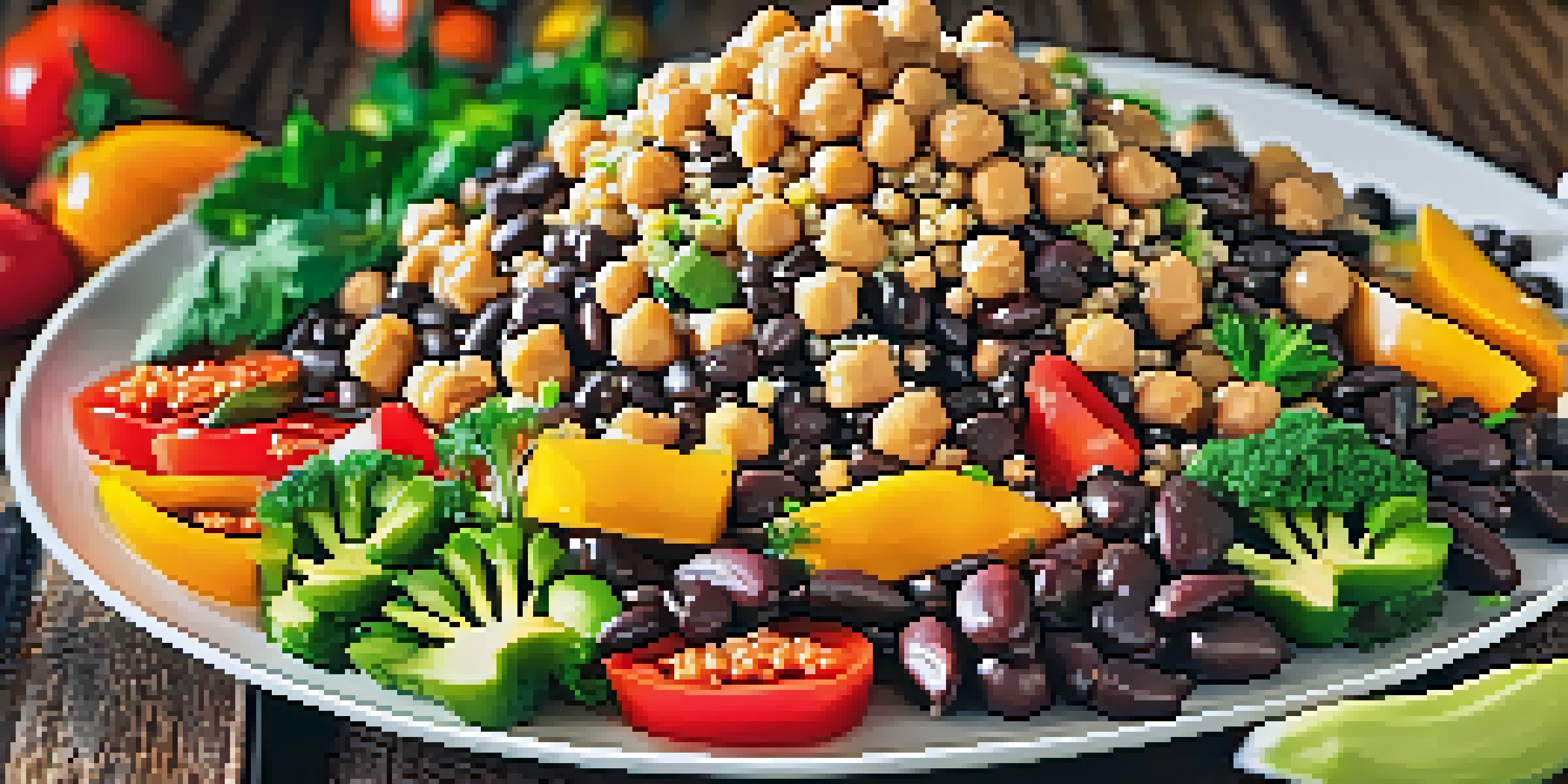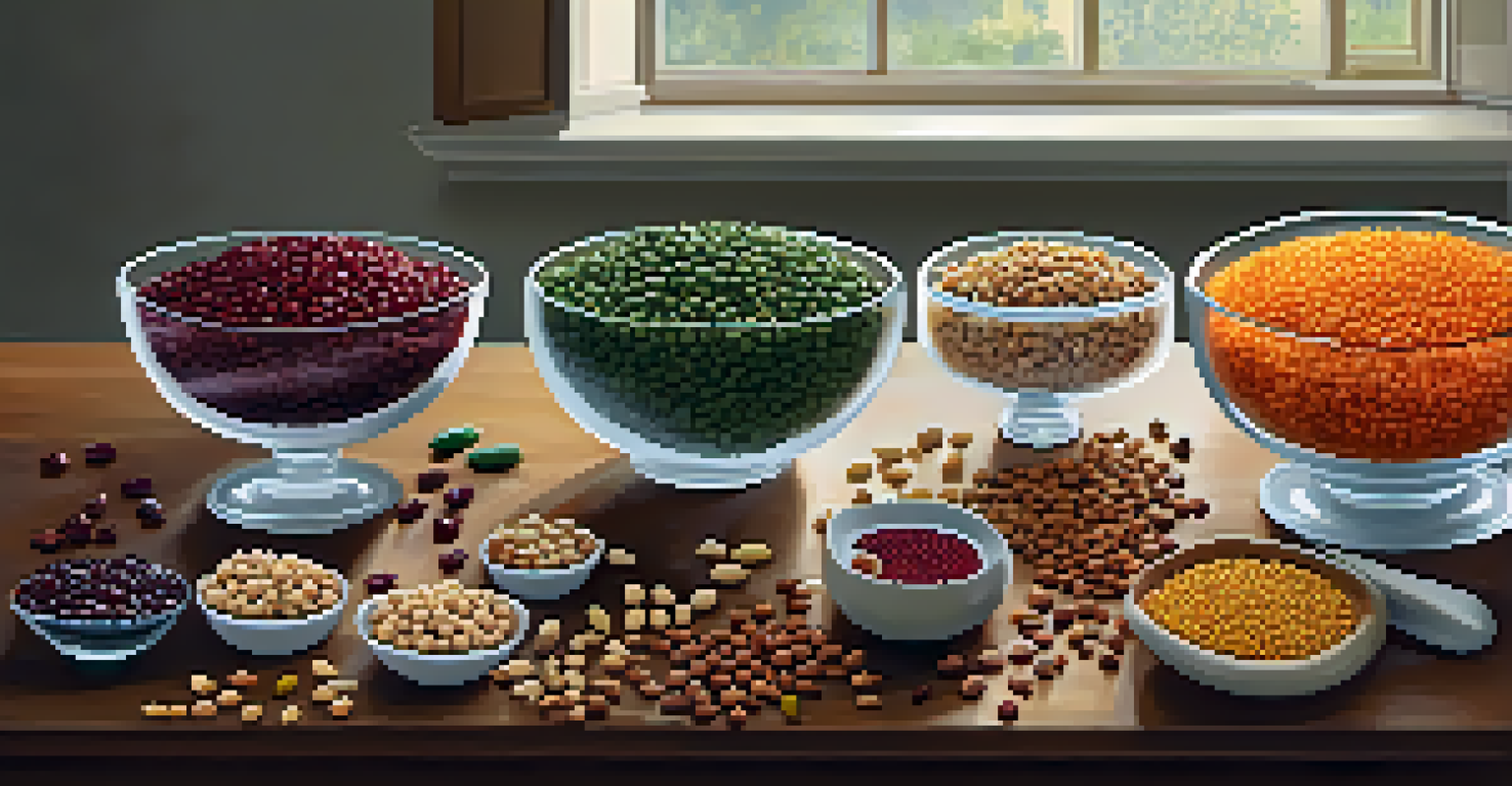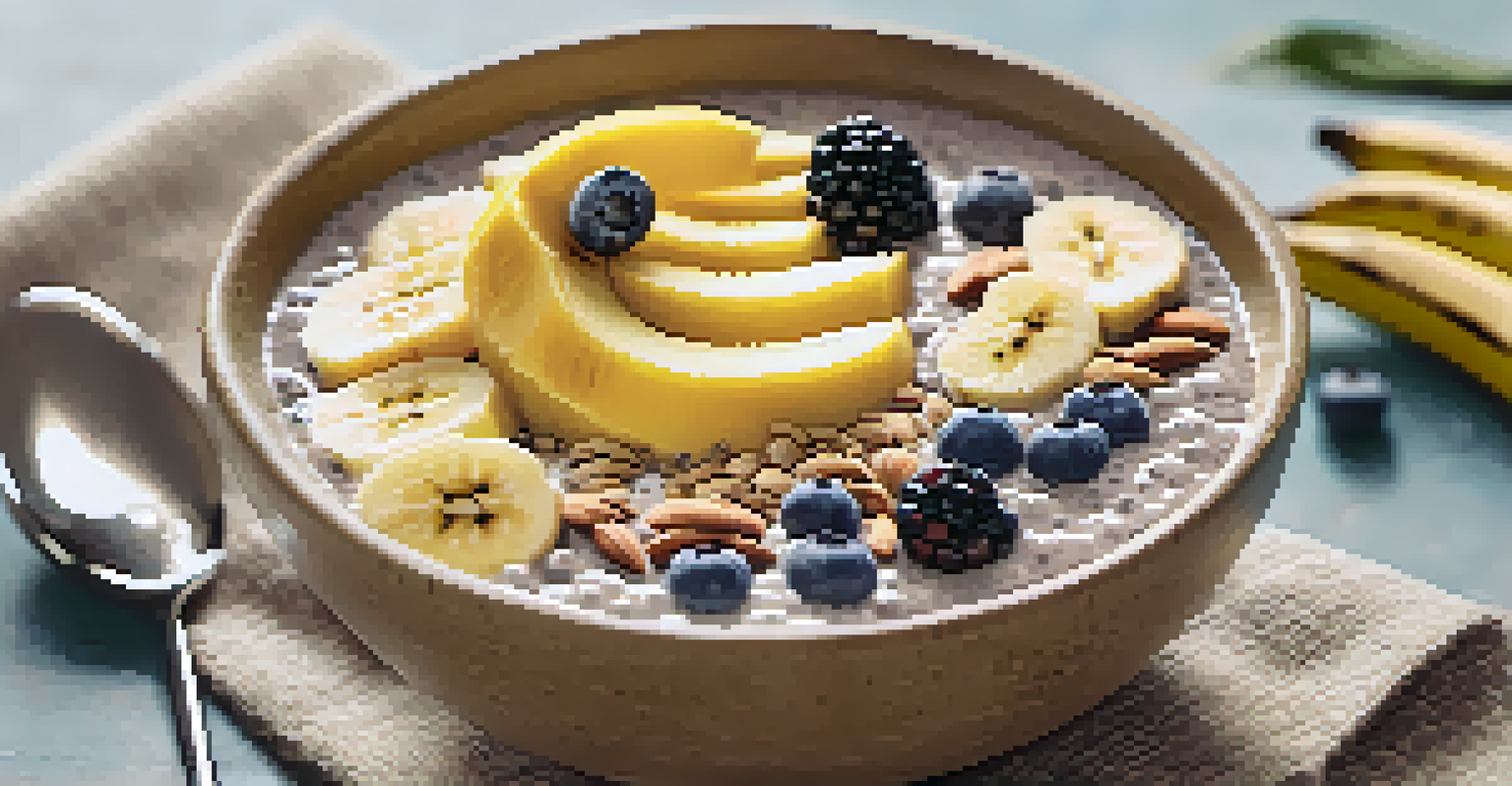Vegan Protein Sources: Building Muscle on a Plant-Based Diet

Understanding Protein and Its Role in Muscle Building
Protein is often referred to as the building block of muscles. It's essential for repairing tissues and supporting growth, making it a crucial part of any fitness regimen. For those on a plant-based diet, understanding how to source adequate protein can make all the difference in muscle development.
Let food be thy medicine and medicine be thy food.
When you consume protein, your body breaks it down into amino acids, which are then used to repair and build muscle fibers after workouts. While many people associate protein with animal sources, there are plenty of plant-based options that can deliver the same benefits. This article will dive into various vegan protein sources to help you effectively build muscle.
For anyone looking to increase their protein intake on a plant-based diet, knowledge is key. Not only will we explore different protein sources, but we’ll also discuss how to combine them for optimal results. So, let’s get started on this journey to plant-powered muscle building!
Legumes: The Powerhouses of Plant Protein
Legumes, including beans, lentils, and chickpeas, are some of the richest sources of protein in the vegan world. They are not only high in protein but also packed with fiber, which can aid in digestion and keep you feeling full longer. Incorporating legumes into your diet can be as simple as adding them to salads, soups, or even making delicious veggie burgers.

For example, a cup of cooked lentils provides about 18 grams of protein, while black beans offer around 15 grams per cup. These nutrient-dense options can easily replace meat in many dishes, allowing you to enjoy hearty meals without sacrificing protein intake. Plus, they are versatile and can adapt to various flavors and cuisines.
Protein Essential for Muscle Growth
Incorporating a variety of protein sources is crucial for repairing tissues and supporting muscle development on a plant-based diet.
To maximize your protein intake, consider mixing different types of legumes throughout the week. This not only keeps your meals exciting but also ensures you're getting a broad spectrum of nutrients. With legumes as a foundation, building muscle on a plant-based diet becomes not just possible but delicious!
Quinoa and Other Whole Grains: A Complete Protein Source
When it comes to grains, quinoa stands out as a complete protein source. Unlike many other plant-based options, quinoa contains all nine essential amino acids, making it an excellent choice for muscle repair and growth. Plus, it's gluten-free and easy to incorporate into a variety of dishes, from salads to bowls.
The food you eat can either be the safest and most powerful form of medicine or the slowest form of poison.
Alongside quinoa, other whole grains like brown rice, farro, and barley can also contribute valuable protein to your diet. While they may not be complete proteins on their own, pairing them with legumes or nuts can create a balanced meal rich in essential amino acids. This synergy is vital for those looking to optimize their muscle-building efforts.
Don’t underestimate the power of whole grains! They're not only nutritious but also provide energy to fuel your workouts. So, whether you’re enjoying a quinoa salad or a hearty bowl of brown rice, know that you’re on the right track to support your muscle-building goals.
Seeds and Nuts: Tiny But Mighty Protein Sources
Seeds and nuts are like little powerhouses packed with protein, healthy fats, and essential nutrients. Varieties such as chia seeds, hemp seeds, and almonds are particularly rich in protein and can be easily added to smoothies, oatmeal, or salads. A couple of tablespoons of hemp seeds can provide around 10 grams of protein, making them an excellent choice for a quick protein boost.
In addition to their protein content, seeds and nuts offer a range of health benefits, including heart-healthy fats and vitamins. They can help reduce inflammation and improve recovery after workouts, which is paramount for anyone focused on muscle building. Plus, their crunch and flavor add delightful diversity to your meals.
Diverse Plant Protein Options Available
Legumes, grains, seeds, and soy products offer rich protein choices that can be deliciously integrated into meals.
To optimize your protein intake, consider snacking on a handful of nuts or adding a sprinkle of seeds to your dishes throughout the day. This not only enhances the nutritional value of your meals but also helps you meet your protein goals without feeling deprived.
Tofu and Tempeh: Versatile Soy Products for Muscle Growth
Tofu and tempeh are two of the most popular plant-based protein sources, and for good reason! Tofu, made from soybeans, is incredibly versatile and can take on the flavors of whatever dish it's in. With about 20 grams of protein per cup, it’s a fantastic option for anyone looking to increase their protein intake while enjoying a variety of textures and flavors.
Tempeh, on the other hand, is a fermented soy product that boasts a nuttier flavor and a firmer texture. It packs even more protein than tofu, often providing around 31 grams per cup! The fermentation process also makes tempeh easier to digest and adds a unique taste that can elevate any meal.
Both tofu and tempeh can be grilled, stir-fried, or added to soups, making them a staple in a muscle-building vegan diet. Embrace these soy products, and you'll find yourself not only meeting your protein needs but also enjoying delicious, satisfying meals.
Plant-Based Protein Supplements: A Convenient Option
For those who find it challenging to meet their protein needs through whole foods, plant-based protein supplements can be a convenient solution. Available in various forms, including powders and bars, these supplements can help you easily boost your protein intake, especially after workouts. Popular options include pea protein, brown rice protein, and blends that combine multiple sources for a complete profile.
Using protein powder in smoothies or baked goods can make it simple to reach your daily protein goals without feeling like a chore. Just be sure to choose high-quality products that are free of unnecessary additives and sugars. This way, you can enjoy the benefits without compromising on health.
Combine Proteins for Optimal Nutrition
Mixing different protein sources enhances amino acid profiles, ensuring effective muscle repair and growth.
While supplements can be helpful, they should complement a well-rounded diet rich in whole foods. Strive to prioritize getting most of your protein from natural sources, and use supplements as an added boost when needed. This balanced approach will ensure you're not only building muscle but also nourishing your body effectively.
Combining Protein Sources for Maximum Benefits
One of the most effective strategies for maximizing protein intake on a vegan diet is to combine different protein sources. This ensures you get a complete amino acid profile, which is crucial for muscle repair and growth. For instance, pairing rice and beans creates a meal that provides all essential amino acids, making it a powerhouse of nutrition.
Another great combination is whole grain bread with nut butter, which not only offers protein but also healthy fats and fiber. By being mindful of how you pair your foods, you can easily meet your protein requirements while enjoying diverse and delicious meals. This approach also adds variety to your diet, keeping your meals exciting and satisfying.

Experimenting with different combinations can lead to discovering new favorite dishes. So, don’t hesitate to mix and match your protein sources; it's a fun way to explore flavors while ensuring your body gets the nutrients it needs for muscle growth.
Conclusion: Embracing Plant-Based Protein for Muscle Building
Building muscle on a plant-based diet is not only achievable but can also be incredibly rewarding. By incorporating a variety of protein sources like legumes, grains, seeds, and soy products, you can meet your protein needs and support your fitness goals. The key is to be intentional about your food choices and explore the wide array of delicious options available.
As you venture into the world of vegan muscle building, remember that every meal is an opportunity to nourish your body. With a little creativity and experimentation, you can create satisfying dishes that are not only good for your muscles but also enjoyable to eat. Whether you’re a seasoned vegan or just starting your journey, embracing plant-based protein is a step towards a healthier lifestyle.
So, dive into the diversity of plant-based protein sources and get ready to power your workouts with delicious, nutrient-rich meals. With the right approach, you'll find that building muscle on a vegan diet is not just possible—it's a delightful culinary adventure!